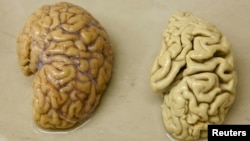New research suggests that a damaged protein, caused by severe head injury, may be behind degenerative brain disorders, including Alzheimer’s disease. Investigators have developed an antibody treatment that may some day be used to prevent or reverse the decline.
Investigators at Beth Israel Deaconess Medical Center in Boston, Massachusetts, are the first to show that a normal brain protein, called tau, becomes misshapen in traumatic brain injury, destroying healthy brain tissue.
The scientists blame repeated blows to the head for the build-up of this highly toxic form of tau, which leads to a neuro-degenerative condition called chronic traumatic encephalopathy.
CTE is seen in soldiers with head injuries and American football players who sustain repeated concussions, affecting their memory, judgment and ability to function.
Neurologist Alvaro Pascual-Leone says the misfolded protein may also be behind Alzheimer’s disease.
“We know that the tau plays a key role in Alzheimer’s disease. And so it’s possible that also there, in the absence of traumatic brain injury, one might be able to protect the brain from the damage in the progression of the disease," said Pascual-Leone.
In an article published in the journal Nature, Pascual-Leone and colleagues report the development of a monoclonal antibody, or protein, that unfolds the misshapen tau and returns it to a normal state.
He says it might be possible to use the antibody to intervene in the disease process, when Alzheimer’s is suspected. And he suggests it could slow the loss of brain function in patients who already show symptoms of Alzheimer's.
“If we were able to slow down the progression or to modify the course of the disease, it would have a big impact on the well-being of the patients and their families," he said.
In experiments with mice, researchers found the misshapen form of tau can begin to form in as little as 12 hours after a head injury.
Eventually, researchers would like to develop a blood test or be able to use imaging to identify the formation of abnormal tau, so patients who have experienced brain trauma can be treated quickly, and the process of neuro-degeneration stopped.




